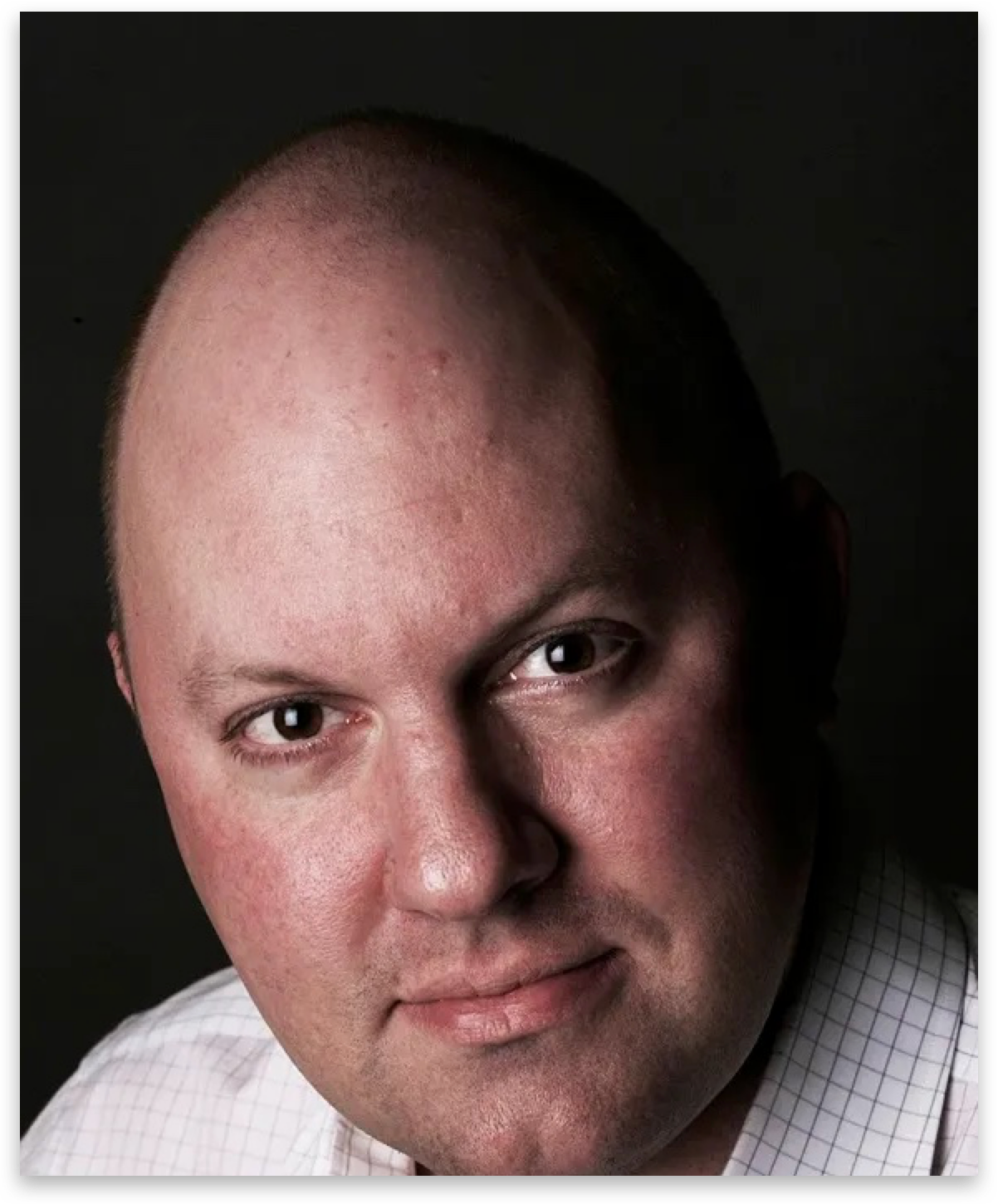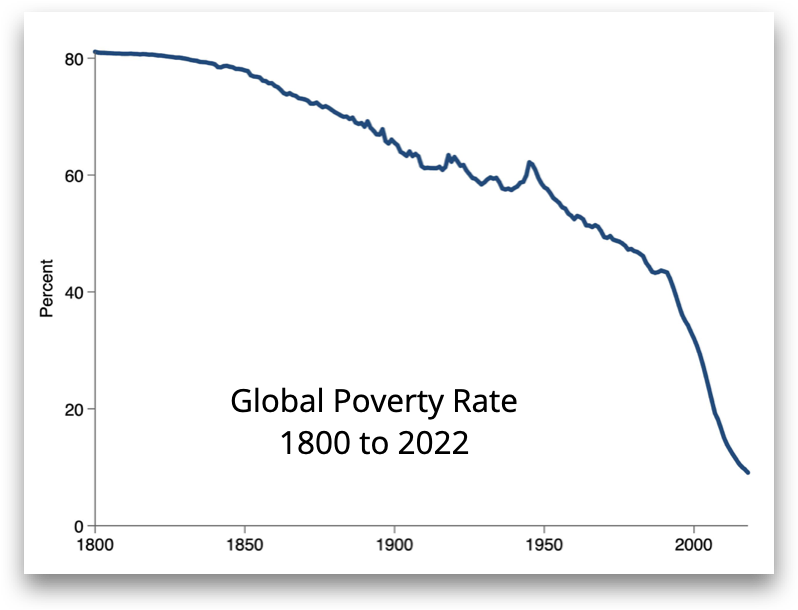AI—Good or bad? Marc Andreessen has an opinion on that and a few other things
Marc Andreessen ran on the edge of Web 1 and 2 and was one of the first to switch gears into Web3. He has something to say to the people who fear technology.
The one thing you can’t deny about Marc Andreessen is when it comes to Silicon Valley lore, the guy has cred. When he was 21 and at the University of Illinois, he invented one of the first web browsers, and then, along with his mentor Jim Clark, introduced the first commercial web browser called Netscape, starting a new computing paradigm that changed all of our lives. I’m very proud to tell everyone that I met Marc back in those days and can confirm to the unbelievers that Marc once had a full head of hair. (See flashback article and photos of Marc at the bottom).
By the 2000s, Marc was also running ahead of the cloud computing curve, and his VC fund, Andreessen Horowitz, was one of the first to switch gears into Web3. So when Marc talks, we should listen. This week, Marc published his latest, sometimes tedious, stream of consciousness called The Techno-Optimist Manifesto. It’s kind of an exhaustive entrepreneurial capitalist set of ‘We Believes’.
Below, we have excerpted and summarized the parts of Marc’s manifesto that inspired us to comment.

Lies
Marc says…
‘We are being lied to. We are told that technology takes our jobs, reduces our wages, increases inequality, threatens our health, ruins the environment, degrades our society, corrupts our children, impairs our humanity, threatens our future, and is ever on the verge of ruining everything.’
Yes, many pundits, even the ‘Godfather of AI,’ are saying very foreboding things about our looming ‘existential crisis.’ Even the richest cat on the planet, whose Kingship depends entirely on buying and developing advanced technology, has said some very crazy shit about robots that move at the speed of light and Terminator-type characters who will eventually determine our fate.
These people are easy to spot and, charitably, are not so much lying as speaking in the absence of facts and are coming from some very deep down, dark places of fear that most likely festered since they were very young.
This kind of group fear goes beyond the techno world and pops up its ugly head more frequently these days. Not to pick any sides here, but Bill Maher circulates a poll showing how the blue team got so whooped up on Covid that 40% of them thought if you didn’t get vaccinated and contracted the virus, you would have a 50% chance of landing in a hospital bed. The correct answer was, of course, less than 1%.
Back in the 1960s, it was all about the Population Bomb, penned by Paul Ehrlich, an entomologist at Stanford University, who predicted a world of 20 billion people 'battling to feed themselves' in a global Lord of the Flies-like drama. This scare ended up triggering a wave of repression around the world, including China’s ‘one-child’ policy that led to huge numbers—possibly 100 million—of coerced abortions. The reality turned out to be that due to our natural ability to adjust, it looks like the world’s population will be topping out at around 9 billion. If anything, we have the reverse problem.
We never seem to remember the lessons of history—but those are a couple of big ones—and it will be the same for the AI era.
Artificial Intelligence
Marc says…
'We believe intelligence is the ultimate engine of progress. Smart people and smart societies outperform less smart ones on virtually every metric we can measure. We believe we are poised for an intelligence takeoff that will expand our capabilities to unimagined heights. We believe Artificial Intelligence is our alchemy, our Philosopher’s Stone – we are literally making sand think. We believe Artificial Intelligence is best thought of as a universal problem solver. We believe Artificial Intelligence can save lives—We believe any deceleration of AI will cost lives.
We believe in Augmented Intelligence just as much as we believe in Artificial Intelligence. Intelligent machines augment intelligent humans, driving a geometric expansion of what humans can do. We believe Augmented Intelligence drives marginal productivity, which drives wage growth, which drives demand, which drives the creation of new supply… with no upper bound.
We are solidly in agreement here. AI should be embraced and not feared. Like all technology, it is merely another advanced tool that will create new wealth and jobs, and if you master it, you will be a more productive and valuable person. So let's cut all the Terminator talk and discover and deploy the benefits of this new craft before we personally, and as a country, get left behind by everybody else who will.
Count me as someone who believes Al should not be regulated. We need to make progress on it as fast as possible for many reasons (including national security). And the track record on regulation is that it has unintended consequences and kills competition/innovation despite best intentions. We’ve enjoyed a golden age of innovation on software and the internet largely due to it not being Al should do the same. The best protection is to decentralize it and open source it to let the cat out of the bag.
—Brian Armstrong, Founder & CEO, Coinbase
This said, aggressive and effective new forms of advertising, political, and IP manipulation are genuine potential downsides to AI, which makes the movement toward decentralized applications and crypto key-based technologies even more imperative. In spite of these challenges, we lean with Bryan Armstong and presumably Marc on AI regulation. The fears are not as great as people think, and free market entrepreneurs generally step up and build new businesses to protect us from bad technology actors.
AI—What do we have to fear?
"AI is more dangerous than mismanaged aircraft design and maintenance or bad car production. It has the potential to cause, however small one might regard the possibility—the destruction of civilization. It's not a trivial potential outcome. We are currently headed towards a state where machines will make more decisions for us and take control of us in ways we can't turn off. It would happen like Terminator—except the intelligence will be in the data centers—but the robots will be the end effectors, and some will be moving so fast that you won't be able to see them without a strobe light." —Elon Musk, April 2023
Truth
Marc says…
Our civilization is built on technology. Technology is the glory of human ambition and achievement, the spearhead of progress, and the realization of our potential. For hundreds of years, we properly glorified this – until recently. I am here to bring the good news. We can advance to a far superior way of living and of being. We have the tools, the systems, the ideas. We have the will. It is time, once again, to raise the technology flag. It is time to be Techno-Optimists.
A little enthusiastic for our taste, but again, yes. The health of the planet Earth depends first on taking care of and honoring the gift of our bodies so we can be more able to do good things for each other and teach our kids to do the same. In 1875, just 150 years ago, the average lifespan was 40 to 45 years for both men and women. The average annual wage in 1875 (2023 dollars) was between $300 and $500.

We all know our amazing rise in the quality of life from these minimalistic days is directly tied to life science innovation. Between the discovery of the first antibiotic, Penicillium, in 1928, to the vaccination discovery boom from Smallpox, Cholera, Polio, and more recently, Hepatitis, and advancements in cancer treatment, we have saved millions from early death. The amount of people who have died due to natural disasters has also shrunk by 99 percent.
During this same period, technological innovation clearly boosted economic efficiencies that drove economic growth, created new jobs, and allowed for more economic mobility. The average monthly wage today is just south of $5,000 a month. Not bad, considering it took us a couple hundred thousand years to get to 500 bucks a month.
The Techno-Capital Machine
The ‘Techno-Capital Machine’ can be basically summed up by Ray Kurzweil’s Law of Accelerating Returns: Technological advances tend to feed on themselves, increasing the rate of further advancement. Innovation drives prices down, freeing up purchasing power, creating more demand, and ‘benefitting those who buy goods and services, which is to say, everyone.’
This all makes sense to us. However, there is much to meditate on regarding the impacts of the Techno-Capital Machine beyond falling prices. Such considerations would include advertiser manipulation, which will accelerate during the AI boom, consumer addiction, lack of recycling, products designed with toxins, food with preservatives and other chemicals, etc. All in the name of more profits and better margins. It takes humans to drive the machine, and the end products are only as noble as the people steering the wheel.
Becoming Technological Supermen
We believe that advancing technology is one of the most virtuous things that we can do. We believe in deliberately and systematically transforming ourselves into the kind of people who can advance technology. We believe that while the physical frontier, at least here on Earth, is closed, the technological frontier is wide open, and We believe in exploring and claiming it.
We believe that we are, have been, and will always be the masters of technology, not mastered by technology. We believe in nature, but we also believe in overcoming nature. We believe in greatness. We admire the great technologists and industrialists who came before us, and we aspire to make them proud of us today.
Great entrepreneurs are as rare as professional athletes. Only 400 players get to play in the NBA. As Steve Jobs also observed, even great entrepreneurs stand on the shoulders of the great ones who came before them. But Supermen? Masters of Technology? Marc, maybe it’s time to re-read Thomas Wolf’s Bonfire of the Vanities.

The Future
Marc’s conclusion..
Our civilization was built on a spirit of discovery, exploration, and industrialization. We believe in the words of David Deutsch: “We have a duty to be optimistic. Because the future is open, not predetermined, and therefore cannot just be accepted, we are all responsible for what it holds. Thus, it is our duty to fight for a better world.” We owe the past and the future. It’s time to be a Techno-Optimist. It’s time to build.
The Cryptonite final take
When Lex Fridman asked Marc in their interview last July, ‘What is the meaning of life?’ Marc simply answered, ‘I do not know the answer to that question.’ He went on to explain that he believes in taking what he has been given and investing it in things that are ‘satisfying’ and not necessarily what makes him happy. Because ‘investing in what makes you happy often leads you to all sorts of dark places.’
In his manifesto, he amplified some of these thoughts. Marc says he embraces David Friedman’s view that people only do things for other people for three reasons—Love, money, or force. In Marc’s benevolent world, ‘love doesn’t scale,’ so we must ‘stick with money.’
Our most significant difference of opinion with Marc is we believe Love is the most scalable power on the planet. All major world religions agree on one basic principle: ‘God is Love,’ and this is not a coincidence. There is always more Love to give. Love is the only thing that can solve two of the most critical challenges we face in the modern world: loneliness and depression. Mother Teresa, who devoted her life to the poor and dying, once said, ‘Loneliness and the feeling of being unwanted is the most terrible poverty.”
Love can not be hacked, stored, or developed into AI code. It is impossible to create enough processing power and storage capability to achieve that feat. This is connected to the same reason we need not worry about robots who imprison us and take over the world. It’s all a ridiculous stretch based on fear.
‘We believe’ we must remain humble and remember technology is merely a tool. It is the person behind the tool who decides whether it will be yielded for the good and charity of all or to be used to track, catalog, manipulate, and destroy. “We believe” that bad actors in free markets can also be exploitative, as evidenced by the character behind FTX. So, a few thoughtful regulations are in order to guard us against our greed, especially for companies who are holding other people’s cash and assets.
The successful testing of the first atomic bomb, codenamed ‘Trinity,’ in July 1945 marks the moment when humans first could destroy the world or cause widespread catastrophic damage. There is no technology, AI app, or free market solution that will ever turn this clock back. There is only one thing scalable enough to save us from this horror, and that is Love. Let’s invest in it.
The day the Internet was commercialized
By Anthony B. Perkins
From the 1993 issue of Red Herring magazine
Silicon Graphics founder Jim Clark began his remarks at a recent gathering of the Stanford Business School Alumni Association by chiding a certain politician for creating the fantasy of the “information superhypeway” as a means of trying to emulate his father’s role in the construction of the interstate highway. The Herring won’t take issue with that insight. But don’t let it fool you into believing that Mr. Clark is dismissing the idea of an interactive highway into the home.
Last January, Mr. Clark resigned from his post as chairman of the multibillion-dollar visual computing company he built to start an interactive software company for the Internet, Mosaic Communications, which could quite possibly represent an even bigger opportunity than he had with Silicon Graphics. “The Internet is more exciting than 3D graphics,” he told the Stanford audience. Mr. Clark is the sole investor (“Venture capital is good for the raw entrepreneur”), and his start-up team includes Mark Andreeson, the 22-year-old whiz kid, and his development team from the University of Illinois, who created the Mosaic interface software, which has been responsible for the soaring popularity of the Internet. “I’ve learned everything I know about the Internet over the last three months and have become convinced that the Internet is the information superhighway, and that Mark Andreeson’s vision is right on,” Mr. Clark said. He explained that the Internet currently has 25 million users, and that number would double by the first quarter of 1995. “By mid-1995, there will be more Internet users than cable TV subscribers,” he prophesied.
Mr. Clark also described what he saw as the impracticality and inefficiency of involving the cable TV companies, which he views as a lumbering and bureaucratic industry “basically controlled by Time Warner and TCI.” Mr. Clark admitted that his comments might surprise some people, given that his last four years at Silicon Graphics, with Time Warner as his partner, he spent evangelizing the cable TV/phone company model for the consumer interactive network. He even speculated out loud that it’s conceivable that he would debate SGI’s current CEO, Ed McCracken, someday on their conflicting visions for how the network will shape up. Unfortunately, that’s all the detail about his new project Mr. Clark leaked that night at Stanford. But he did promise that Mosaic would be making some announcements shortly, including news about the significant strategic relationships the company has formed.










Why is there no source citation for the global poverty chart?